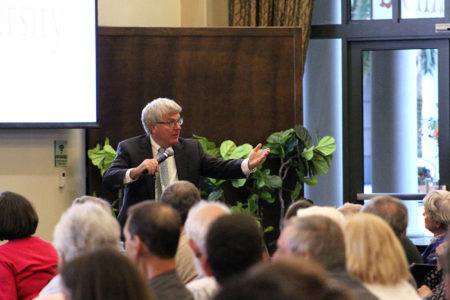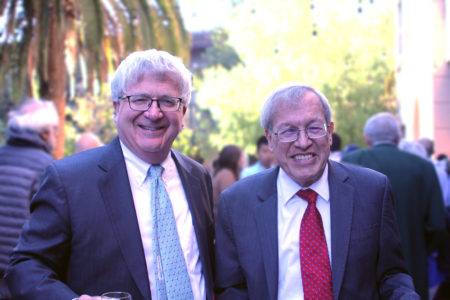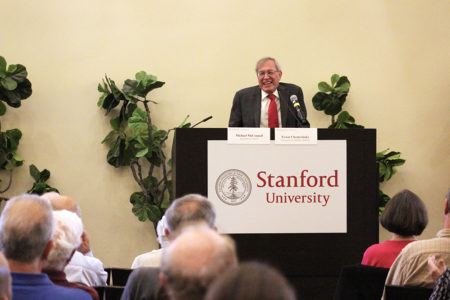Constitution Day: Free Speech on College Campuses
Independence Day may be the most popular American holiday but many historians highlight September 17, the day the U.S. Constitution was signed, as the day the United States “grew up” and became the nation it is today.
231 years ago, Alexander Hamilton, James Madison and other early American political figures proposed a meeting where state delegates would discuss, debate and revise the Articles of Confederation. The goal was to turn the Articles into something that could provide the framework for an enduring system of government. Fifty-five state delegates came to the same Philadelphia building where the Declaration of Independence had been signed. After much heated debate, with several delegates leaving before the convention ended, thirty-nine delegates signed the U.S. Constitution on September 17, 1787, making it the oldest functioning constitution in the world. Previously known as “Citizenship Day,” September 17 became an official federal holiday called “Constitution Day” in 2004.
A National Conversation
Each year, all educational institutions that receive federal funds, hold a Constitution Day educational program. The federally-mandated educational lecture is not only intended to commemorate the signing of the U.S. Constitution but also to continue the constitutional conversation on campuses and elsewhere.

On September 17, the Stanford Constitutional Law Center at Stanford Law School hosted Erwin Chemerinsky, the dean of the law school at University of California-Berkeley. Chemerinsky’s lecture “Free Speech on College Campuses,” took place at Stanford’s Paul Brest Hall with more than 300 people in attendance, consisting of mostly Stanford Law and Stanford students.

SLS Professor Michael McConnell introduced Chemerinsky as “a prolific speaker on the topic of free speech and the second most-cited legal scholar in the United States.” McConnell also told the audience that he and Dean Chemerinsky have a long-standing tradition of debating each other and, in line with the spirit of Constitution Day, “we are an example of how people can disagree yet have productive, civil discourse and continue to respect each other.”
Why Free Speech on College Campuses Is an Enduring Value
“As long as there have been college campuses, there have been questions and arguments about free speech,” began Chemerinsky. “In the 60s, students claimed the right to free speech and the administration tried to stop them. Now it’s the students who want to prohibit what they claim is hate speech.”

During his Constitution lecture, Chemerinsky outlined his thoughts about what the U.S. Constitution guarantees citizens regarding free speech on college campuses. First and foremost, Dean Chemerinsky outlined his guiding first amendment principles for college campuses: “All ideas should be able to be expressed on campuses. The First Amendment in the U.S. Constitution provides freedom of speech protection and that includes offensive ideas and the courts have agreed.”
According to Chemerinsky, free speech is not absolute, and he outlined categories of unprotected or less-protected speech:
- Speech that incites illegal activity – It must be proven that there is a substantial chance of illegal activity and the speech promotes or incites the crowd to commit illegal activity. As an example, a speaker at a rally who encourages listeners to commit vandalism in his/her speech. The probable reaction of a crowd can’t be a basis for prohibiting the speaker.
- True threats – A true threat is a threatening communication that can be prosecuted under the law. The Supreme Court has ruled that true threats receive no First Amendment protection. As an example, there is a federal law that makes it a federal crime to threaten the president. This law does not cover mere hyperbole, only a real threat that a reasonable person will think is a threat. “At Berkeley, students have sometimes told me that they feel threatened by the presence of certain speakers. That is understandable, and I certainly sympathize with them. But for purposes of the law, that feeling is not sufficient to constitute a true threat,” said Chemerinsky.
- Harassment – Speech in a work environment that creates a threatening environment is not protected.
- Platforming, or Heckler’s Veto – Platforming, or what is called the “Heckler’s Veto” in legal circles, on campuses is where an audience engages in yelling or making other loud noises during a speech, preventing the speaker from being heard. Platforming is not a form of protected speech.
“Campuses have an obligation to create an open environment where all speech should be heard. And, institutions should speak out when hateful speech is presented. As the voice of the institutions we represent, faculty and the administration can condemn hateful speech and explain why hateful speech is inconsistent with our community’s values. Importantly, campuses should encourage students to engage in counter speech. We don’t protect students by repressing speech. We have a legal and moral duty to protect physical safety but if we start prohibiting ideas that make people feel uncomfortable, that is against the Constitution. We don’t need to protect the speech we like, we MUST protect the speech we don’t like. And, it is always better to allow all ideas to be expressed than allow government to pick and choose which ideas we can hear and engage in,” concluded Chemerinsky.
The engaged audience in the standing-room-only hall had an opportunity to participate in a Q&A with Chemerinsky at the end of the lecture and the conversation then continued at a reception after the event.
Learn more about Dean Chemerinsky’s scholarship on the Constitution and free speech by reading his new book, Free Speech on Campus.
About Dean Chemerinsky
Erwin Chemerinsky is dean of the law school at University of California-Berkeley. He has also held positions at University of California-Irvine School of Law, Duke University, and University of Southern California Law School. He is the author of ten books, including The Case Against the Supreme Court, published by Viking in 2014, and two books published by Yale University Press in 2017, Closing the Courthouse Doors: How Your Constitutional Rights Became Unenforceable and Free Speech on Campus (with Howard Gillman). In 2016, he was named a fellow of the American Academy of Arts and Sciences. In January 2017, National Jurist magazine again named Dean Chemerinsky as the most influential person in legal education in the United States.
About the Stanford Constitutional Law Center
The Stanford Constitutional Law Center focuses particularly on the separation and scope of legislative, executive, and judicial powers; the structure of constitutional democracy; the freedoms of speech, press, and religion; and the right of privacy, including the privacy of personal data in a digital world. Founded in 2006 by former Dean Kathleen Sullivan, the Constitutional Law Center is currently led by Faculty Director Michael W. McConnell, Richard and Frances Mallery Professor of Law.
About Stanford Law School
Stanford Law School is one of the nation’s leading institutions for legal scholarship and education. Its alumni are among the most influential decision makers in law, politics, business, and high technology. Faculty members argue before the Supreme Court, testify before Congress, produce outstanding legal scholarship and empirical analysis, and contribute regularly to the nation’s press as legal and policy experts. Stanford Law School has established a model for legal education that provides rigorous interdisciplinary training, hands-on experience, global perspective, and focus on public service, spearheading a movement for change.
